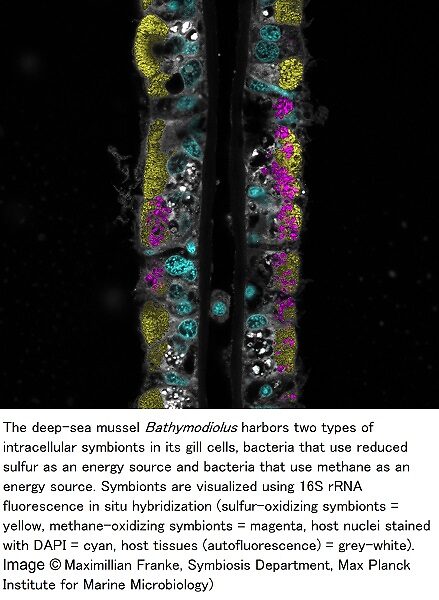[POSTPONED] Marine Microbial Diversity - Genomes to Communities

Date
Location
Description
URGENT NOTICE ON POSTPONEMENT
The OIST Marine Microbiology Workshop has been postponed to some time-to-be-determined later this year. We kindly ask for your understanding.
If you are an invited speaker or a participant of this workshop, please follow the instructions from the organizers regarding cancellation/reimbursment procedures provided via email.
***********************
Most of life’s genetic and metabolic diversity is microbial, since Life’s beginnings and throughout its history to the present day. This is especially true for the world’s oceans, in which microorganisms account for 50- 90% of the biomass. The number of marine microbes exceeds 3.6 x 1029 cells. Viral and phage numbers are ten-fold higher. Although they are largely invisible to the naked eye, microorganisms are pervasive in all marine environments and have a profound impact on earth’s habitability and biodiversity. Diverse microbial forms catalyze processes in the biogeochemical cycles of nitrogen, sulfur, iron and manganese including export of carbon to the deep oceans, and they serve essential roles for the survival of multicellular plant and animal taxa. Today all multicellular forms continue to be completely dependent upon microbial populations for their continued survival either through their impact on the environment or their participation in symbiotic and mutualistic relationships. Today’s advances in marine microbial ecology leverage the power of “omic” technologies, a cornerstone of technology at OIST. Building on OIST’s strategy, which advances science through interdisciplinary research, the workshop “Marine Microbial Diversity - Genomes to Communities“ will engage OIST faculty from the Marine Genomics, Molecular Genetics, Marine Biophysics, Marine Climate Change, Genomics and Regulatory Systems, Computational Neuroethology, Ecology and Evolution units, and faculty from other units with potential collaborative ties to marine biology. The over-arching goal is to introduce cutting-edge marine microbiology to OIST as a strategic component for expanding its Marine Science program.
Scope
- Microbial diversity and evolution in the sea viewed through the lens of omic technology
- Symbiotic microbes in marine animals
- Deep diversity and carbon cycling
- The role in the sea
Organizers
(in alphabetical order)
- Nicole Dubilier, Max Planck Institute for Marine Microbiology
- Mitchell Sogin, Marine Biological Laboratory Woods Hole, mitchellsogin@gmail.com
Confirmed Participants
(in alphabetical order)
- Silvia Acinas, Institut de Ciències del Mar
- Otto Cordero, MIT
- Suhelen Egan, Centre for Marine Science and Innovation (CMSI)
- Shana Goffredi, Occidental College
- Russell Hill, Institute of Marine and Environmental Technology, University of Maryland Center for Environmental Science
- Filip Husnik, OIST
- Fumio Inagaki, JAMSTEC
- Sairah Malkin, University of Maryland Center for Environmental Science
- Monica Medina, Department of Biology, The Pennsylvania State University
- Victoria Orphan, Cal Tech
- Jill Petersen, University of Vienna
- Martin Polz, Massachusetts Institute of Technology
- Jean-Baptiste Raina, University of Technology, Sydney
- Gene Tyson, Australian Centre for Ecogenomics
- Fengping Wang, Shanghai Jiao Tong University
- Nicole Webster, Australian Institute of Marine Science
- Lizzy Wilbanks, University of California
- Tanja Woyke, DOE Joint Genome Institute
Program
April 28, 2020 – OIST Main Campus C209
- 9:00 Mitchell Sogin Introduction to Marine Microbiology Workshop
- 9:30 Nicole Dubilier Why diversity matters: Symbiont heterogeneity provides multiple benefits to deep-sea mussels
- 10:05 Monica Medina Microbial-Host Co-development in Cnidarian Holobionts from Jellyfish to Corals
- 10:40 Morning Break
- 11:00 Nicole Webster Sponge Symbiomics – Unlocking the symbiotic repertoire of coral reef sponges
- 11:35 Russell Hill The role of sponge and their bacterial symbionts in nutrient cycling in coral reef ecosystems
- 12:10 Lunch
- 13:10 Filip Husnik Bacterial and archaeal symbioses of marine protists
- 13:45 Fengping Wang Archaea, the hidden important player in carbon cycling in marine sediments
- 14:20 Jill Petersen Chemosynthetic symbionts – supporting animal and ecosystem health for over 400 million years
- 14:55 Afternoon Break
- 15:15 Shana Goffredi Suspension of disbelief: Deep-sea animals continue to defy conventional ideas about nutrition
- 15:50 Martin Polz The structure of phage-host interactions
- 16:25 Tanja Woyke Studying uncultivated diversity - from viral giants to microorganisms
- 18:30 Dinner
April 29 – OIST Seaside House
- 9:00 Jean-Baptiste Raina The role of bacterial behavior in microbial interactions
- 9:35 Suhelen Egan Microbial community assembly and disease of maroalgae
- 10:10 Sairah Malkin Charismatic thiotrophs of Chesapeake Bay’s sediments
- 10:45 Morning Break
- 11:05 Fumio Inagaki The deep subseafloor biosphere: abundance, diversity and ecological roles
- 11:45 Victoria Orphan, Single cell perspective on the genomic and phenotypic variation among uncultured deep-sea anaerobic methane-oxidizing microbial consortia
- 12:20 Lunch
- 13:20 Elizabeth Wilbanks How Ecology of microorganisms influences evoloution and drives nutrient cycling in marine environments
- 13:55 Otto Cordero Inferring the functional units of marine microbiomes through evolutionary genomics
- 14:30 Gene Tyson Genomic insights into coral-microbe symbioses
- 15:05 Afternoon Break
- 15:25 Silvia Acinas Ecogenomics of uncultured microbial prokaryote
- 16:00 Mitchell Sogin Breakout Sessions - Future of Marine Microbiology at OIST
- 17:00 Mitchell Sogin Plenary Session Future of Marine Microbiology at OIST
- 17:30 End of Meeting
Access
OIST is located in the middle part of Okinawa, where is a spectacular resort area.https://www.oist.jp/access-map
※Details of the transportation information will be sent to the invited speakers from OIST Conference and Workshop Section (workshop@oist.jp) separately.
Website URL
Intra-Group Category
Subscribe to the OIST Calendar: Right-click to download, then open in your calendar application.



